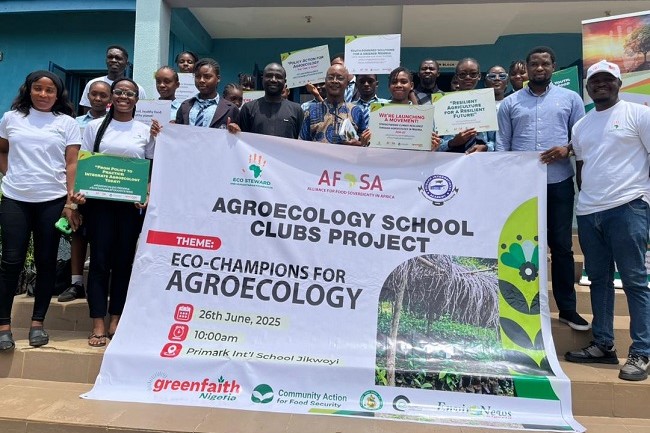Undoubtedly, the Agroecology Club Project (ACP), launched by the EcoSteward and Humanitarian Foundation (EHF) in schools, will contribute to meeting the growing demand for actively involving young people in the struggle for climate-resilient and sustainable food systems.

By teaching students environmentally friendly farming techniques like composting, organic pest control, and crop rotation – which not only improve soil fertility and crop yield but also lessen reliance on dangerous chemicals, fostering long-term sustainability and ecosystem health – this programme is also expected to add to the improvement of food production and ecological preservation.
In response to a question about what inspired the project’s conception, Obinna Nweze, the organisation’s programme director, hinted that the desire to bridge this existing gap was what informed their decision to introduce agroecology to students at a young age.
“The lack of practical environmental education in schools further motivated the creation of this initiative, designed to empower students with both knowledge and hands-on skills,” he told a group of participants who had gathered on Thursday, June 26, 2025, at Primark International Academy in Jikwoyi, Abuja, the capital of Nigeria, to witness the groundbreaking ceremony.
According to him, the event’s theme, “Eco-Champions for Agroecology,” emphasises his organisation’s efforts to cultivate a new generation of young leaders who will not only be knowledgeable about ecological farming concepts, but also passionate advocates for food justice and environmental protection.
As Nigeria seeks solutions to the numerous environmental challenges it faces, such as land degradation and biodiversity loss, Nweze explained that the aim of selecting the students as champions is to position them as future change-makers who will lead the charge in building greener communities through informed action and leadership.
These young leaders will carry out regular club activities, including mentorship and training on how to maintain their school gardens. Additionally, they will also monitor and document the progress of the project to measure its impact and inform future recommendations.
“The goal is to expand to more schools and use the lessons learnt to advocate for greater integration of agroecology into educational and national development frameworks,” said the EHF programme director.
Sir Oko Agaji, the principal of Primark International Academy, stated in his introductory remarks that he was delighted that the programme had been introduced to his school due to the fact that it will help address the misunderstanding that agriculture is an outdated practice by educating the students at a young age.
He went on to say that the school is fully aware of agriculture’s benefits to society, which is why they have long had a club to promote its growth.
“Personally, I have a garden at my home, and I understand the benefits I am gaining from it,” he said, particularly how it is supplementing the food that he and his family consume.
He assured that, moving forward, they would continue to collaborate with EHF and her partners to ensure that agriculture receives robust support in both practical fieldwork and classroom environments.
Oji Nwachukwu, a senior secondary three student at the school and one of the 20 recently crowned champions, said the event had an impact on her because of the new things she learnt.
“My takeaway from this programme is to say no to inorganic fertiliser that destroys our ecosystem and human health,” she said, vowing to use her newly acquired knowledge to mobilise and teach other students about some of the sustainable farming methods.
Highlights of the occasion included speeches by representatives of the Alliance for Food Sovereignty in Africa, Ecocykle Development Foundation (EDF), GreenFaith Africa, Global Initiative for Food Security and Ecosystem Preservation (GIFSEP), Community Action for Food Security, and EnviroNews, who urged the students to preserve the environment while pursuing their need for food production. Furthermore, the school received a handbook on understanding agro-ecological techniques to help guide the students and improve their knowledge of the topic.
While the excitement lingered, one major issue highlighted by stakeholders was the long-term sustainability of this commendable project. Many believe that incorporating new activities such as demonstration gardens for hands-on learning, teacher training to support ongoing efforts in schools, and collaboration with local organisations to provide mentorship will foster a strong sense of student ownership while also providing the tools and resources that the clubs require to thrive beyond the pilot phase.
By Etta Michael Bisong, Abuja
